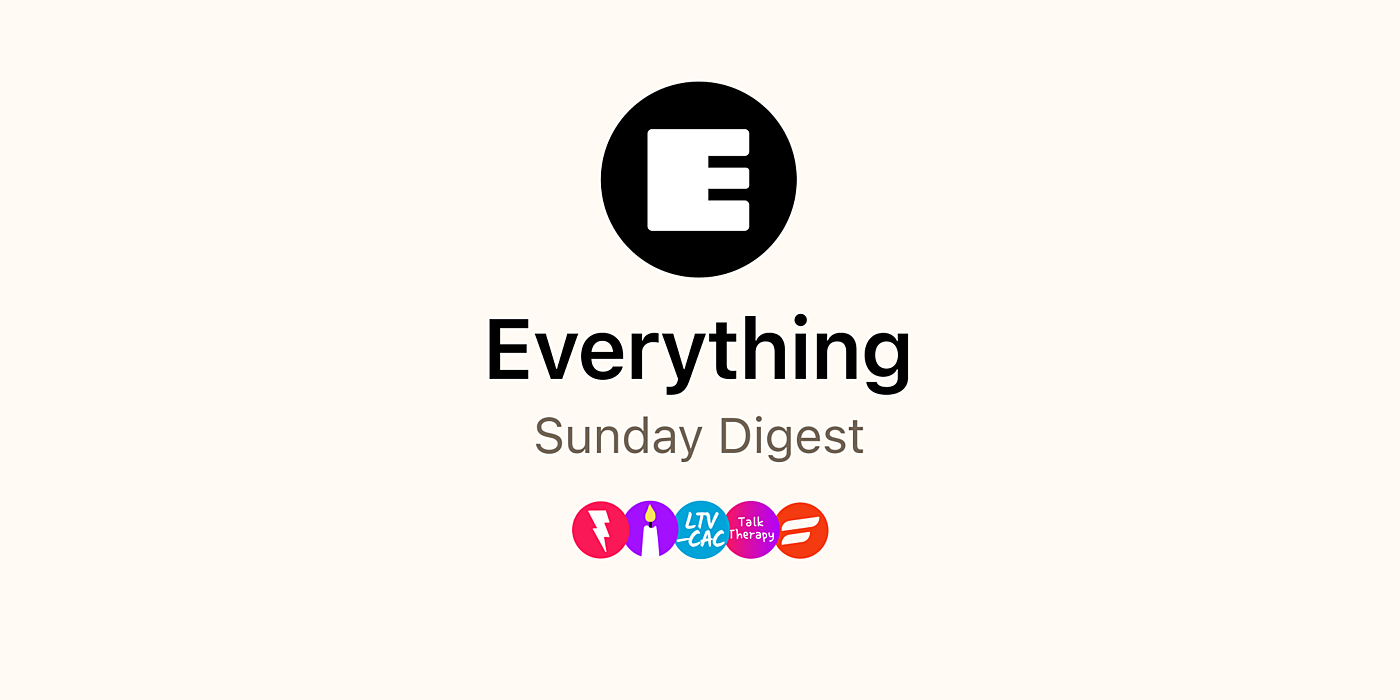
Hello and happy Sunday!
We’re trying something new this week with the Sunday Digest, with a more streamlined design and generous summaries of each post. That way even if you don’t have time to read the full essays, you can still get something valuable out of it!
Do you like this? We’d love to hear! Please let us know what you think using the feedback form at the end of this email.
What we published this week
We published four new articles this week totaling ~8,000 words. We dove into sugar ads from the ‘70s, new critiques of disruption theory, the end of accounting, and the financials of the New York Times.
How to manage your subscription
You can subscribe and unsubscribe from individual newsletters inside of the bundle without affecting your overall subscription to what we write. If you want to turn on or off email notifications for a specific newsletter, you can manage your settings here.
Enjoy!
Divinations
Get smarter about strategy
🔮 Oatly: The New Coke
In a guest post, Nat Eliason dives into Oatly’s deceptive marketing, which plays on increasing consumer awareness of health and the environmental impact of industrial animal agriculture. Although the company suggests that oat milk is healthier and “made for humans,” unlike cow’s milk, the addition of sugar and vegetable oil actually makes it worse than whole milk.
Nat compares Oatly’s marketing to historical examples like sugar and tobacco to emphasize the similarity in obfuscation strategies:
- Obscure the Truth: Make vague claims that make consumers feel good.
- Create Confusion: Fund research showing the harmful ingredients are healthy, or at least not provably harmful.
- Strawman the Disagreements: When people criticize the ingredients or health claims, strawman their arguments by focusing on the most easily dismissed criticisms, or by pointing the finger elsewhere. (2,774 words)
From the Divinations archives — “PepsiCo goes DTC.”🔒 Nathan and Adam assess Pepsi’s new DTC strategy for snacks, a pivot accelerated by the pandemic. They suggest that executing well on marketing, user experience, and customer service as well as building on existing brand loyalty will allow PepsiCo to compete with existing online retailers. (1,504 words)
🔮 Disrupting Disruption: Alex Danco
Nathan’s series on challenges to Clay Christensen’s theory of disruption continues! This week, he focuses on Alex Danco, former VC and current executive at Shopify, who has written two essays critiquing the theory.
The first is more compelling, and argues that Apple has avoided disruption because they systematically and strategically raise customer expectations. Remember, you can only get disrupted when your product’s performance exceeds what customers require. Apple causes their customers to require more by expanding their concept of what is possible. Their first versions barely meet the expectations they create, but this actually gives them room to improve over time.
The second is less compelling, and argues that Clay Christensen failed to predict the success of the iPhone because he was more focused on individual companies that look sustaining, rather than ecosystems of companies that collectively are disruptive, even if the individual members of the ecosystem themselves look sustaining. The example Danco gives for this is the mobile photography ecosystem, which was disruptive to stand-alone cameras and photo printing. But the idea of disruptive ecosystems of companies is already contained in disruption theory, and Christensen even coined the term “value network” to describe it. And, to be clear, the iPhone really was a sustaining innovation relative to previous smartphones. So how did they succeed? Perhaps Apple’s strengths as a consumer PC company gave them more incumbency advantages than RIM and Nokia had, even though they were already in the smartphone market and Apple was not. (2,178 words)
🔮 Means of Creation #5: Nathan Barry
Nathan and Li Jin spoke with Nathan Barry, co-founder of ConvertKit, an email marketing platform for creators. The three discussed ConvertKit’s growth to 56 employees and whether newsletters, books, or courses are the fastest way for creators to turn their passions into a livelihood. Video coming soon!
RSVP for next week’s Means of Creation with Adam Davidson, of NPR and New Yorker fame. Adam is also the author of The Passion Economy, and we’ll be talking with him this Friday August 14 at 2pm EDT. This one is free, so we’d love to see you there even if you’re not a paying subscriber!
Napkin Math
Get smarter about investing
📐 Intangible Assets: The Invisible Value Driver
Adam builds on the book The End of Accountingby Baruch Lev and Feng Gu to argue that there are four problems with financial information:
- Financial information no longer accounts for stock price fluctuations.
- It’s not valuable even when it does come out because other information (analyst recommendations, non accounting reports) has larger impacts on share price.
- Even ignoring capital markets effects, past earnings growth doesn’t predict future earnings growth.
- Analyst price estimates are dispersing, implying that information quality is decreasing.
The main cause is intangible assets. We have shifted from an industrial economy to an information economy, yet the investments in information assets aren’t recognized in financial statements. They are expensed instead of capitalized. It’s beneficial for investors to change accounting to capitalize intangible assets, but incentives for corporate managers and auditors make it unlikely to change.
The implication for investors? Legacy financial metrics should play a lesser role in analyzing businesses. Instead, use many quantitative and qualitative analytical methods and study how top performers have succeeded. (2,358 words)
📐 New York Times: Investing In The Long Term 🔒
Adam contextualizes NYT’s Q2 earnings in the context of their pivot to digital subscriptions.
NYT is 65% of the way to its goal of 10 million subscribers by 2025. The stock reflects that: it has risen 50% since early March, implying a market cap of ~$7.75 billion. Moreover, NYT’s discounting strategy has worked well to acquire customers, who are retaining well enough that it’s a lever that it can keep pushing on.
In addition, although advertising revenue has tanked during the pandemic, NYT’s margins have held steady. (922 words)
Praxis
The modern frontier of productivity
➰ P.A.R.A. — an introduction🔒
This week, we launched a re-run of one of Tiago Forte’s most popular series — P.A.R.A., which is the simple principle he and thousands of others use to organize their digital lives.
The post first explains each component of P.A.R.A — which stands for Projects, Areas, Resources, and Archives. It then dives into how to start implementing the P.A.R.A. system across your programs to better prioritize projects, understand the scope of your commitments, and track your progress. (3,892 words)
Superorganizers
How the smartest people in the world organize what they know to do their best work
⚡️ From the Superorganizers archives — “The Fourfold Book Index” 🔒 Dan does a deep dive on the note-taking method he’s been using since high school to remember what he reads. It’s a powerful system, but the ingredients are simple: just a sheet of paper, a pencil, and some folding skills. (1,689 words)
Talk Therapy
A podcast about what happens when two friends start a business
💞 #17 - How should we compensate creators?
Nathan and Dan discuss how a new kind of media business model requires them to rethink how to fairly compensate writers for the bundle.
💞 #18 - How do we decide what to publish?
Nathan and Dan discuss how they test for what kind of content resonates with Everything’s audience and incubate new newsletters within existing ones.
Don’t see your favorite podcast app here? Just search for “talk therapy” and look for our red and purple cover art!
FROM OUR NETWORK
☕️ The S-1 Club | Rackspace rises again
An in-depth analysis of Rackspace, a cloud computing company, and the issues it needs to address as it plots its return to the public markets. We found it useful both as a primer for the last decade of the cloud services businesses and as a case study of the challenges and opportunities of a private equity buyout.
How did you feel about this week’s digest?
This issue was written by Saanya Jain and edited by Nathan Baschez. Thanks, and see you next Sunday :)
The Only Subscription
You Need to
Stay at the
Edge of AI
The essential toolkit for those shaping the future
"This might be the best value you
can get from an AI subscription."
- Jay S.
Join 100,000+ leaders, builders, and innovators

Email address
Already have an account? Sign in
What is included in a subscription?
Daily insights from AI pioneers + early access to powerful AI tools








Comments
Don't have an account? Sign up!